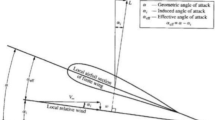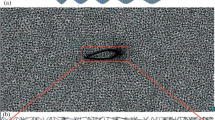Abstract
This study examines the effect of bio-inspired serrations on aerodynamic performance of a Non Slender cropped delta wingsuit model. In this study, Gottingen 228 aerofoil is used for designing the wingsuit model having AR of 1.00 using CAD software Solidworks. Ansys Fluent solver has been utilised to solve the Reynolds Averaged Navier–Stokes (RANS) equations with a k−\(\omega\) turbulence model. The flow velocity was kept at 45 m/s with Re ~ 2.6 × 106 and angle of attack was varied from 0° to 45°. Computations revealed that the wingsuit with serrations in comparison with clean basemodel had a notable increase in maximum lift coefficient. The results were compared with the experimental and CFD results of existing literature in the open domain. The serrated non slender delta wingsuit performs extremely well giving a lift coefficient of 2.74 and \(C_{{\text{L}}}\)/\(C_{{\text{D}}}\) of 9.72. The results were validated by comparing them with flat plate and non slender cropped delta wing results available in the existing literature. A good agreement in terms of trends was obtained for \(C_{{\text{L}}}\) and \(C_{{\text{D}}}\) which indicates that proposed wingsuit should perform well aerodynamically under typical wingsuit flying conditions.















Similar content being viewed by others
Explore related subjects
Discover the latest articles and news from researchers in related subjects, suggested using machine learning.Abbreviations
- \(C_{{\text{L}}}\) :
-
Lift coefficient
- \(C_{{\text{D}}}\) :
-
Drag coefficient
- LE:
-
Leading edge
- TE:
-
Trailing edge
- AR:
-
Aspect ratio
- c:
-
Chord
- Re:
-
Reynolds number
- LAR:
-
Low AR
- \(C_{{{\text{Lmax}}}}\) :
-
Maximum lift coefficient
- \(\alpha {\text{or AoA}}\) :
-
Angle of attack
References
https://en.wikipedia.org/wiki/Wingsuitflying. Accessed 26 July 2020
Abrams M (2006) Birdmen Batmen, and Sky-flyers: wingsuits and the pioneers who flew in them, fell in them, and perfected them. Harmony Books
Weed WS (2015) "The Flight of the Bird Men," Popular Science, 18 June 2003 [Online]; Available:http://www.popsci.com/military-aviation-space/article/2003-06/flight-bird-men. Accessed 20 Apr 2015
Lamb R (2015) How wingsuit flying works, HowStuffWorks, [Online]. http://adventure.howstuffworks.com/wingsuitflying.htm. Accessed 3 Mar 2015.
Birdman International (2015) "Birdman Story," Birdman International, [Online]. http://www.birdman.com/company/story/. Accessed20 April 2015
Rao C, Ikeda T, Nakata T, Liu H (2017) Owl-inspired leading-edge serrations play a crucial role in aerodynamic force production and sound suppression. Bioinspir Biomim 12:046008. https://doi.org/10.1088/1748-3190/aa7013
Murray MM, Howle LE, Fish FE (2004) Leading-edge tubercles delay stall on humpback whale. Phys Fluid 16(5):39–42
Zhang PF, Wang JJ, Liu Y, Wu Z (2009) Effect of taper ratio on aerodynamic performance of cropped nonslender delta wings. J Aircr 46(1):320–325
Zhang X, Wang Z, Gursul I (2016) Interaction of multiple vortices over a double delta wing. Aerosp Sci Technol 48:291–307
Naeini HK, Nili-Ahmadabadi M, Kim KC (2019) An experimental study on the effect of a novel nature-inspired 3D-serrated leading edge on the aerodynamic performance of a double delta wing in the transitional flow regime. J Mech Sci Technol 33(12):5913–5921
Chen H, Pan C, Wang J (2013) Effects of sinusoidal leading edge on delta wing performance and mechanism. Sci China Technol Sci 56(3):772–779
Liu X, Jawahar KH, Azarpeyvand M (2016) Wake development of airfoils with serrated trailing edges. In 22nd AIAA CEAS Aeroacoustics Conference [AIAA 2016–2817] American Institute of Aeronautics and Astronautics Inc. (AIAA). https://doi.org/10.2514/6.2016-2817
Tanner M (1972) A method for reducing the base drag of wings with blunt trailing edge. Aeronaut Quart 23:15–23
Hussain U, Malook SU, Shabir B, Ali O (2017) Effect of trailing edge serration on the lift and drag characteristics of NACA0012 airfoil wing. In: 35th AIAA Applied Aerodynamics Conference, 5–9 June 2017, Denver, Colorado
Ferguson ME, Agarwal RK (2018) Design and computational fluid dynamics analysis of an idealized modern wingsuit. In: AIAA SciTech Forum, 8–12 January 2018, Kissimmee, Florida, 2018 AIAA Aerospace Sciences Meeting
Anderson JD (2011) Fundamentals of aerodynamics. McGraw Hill
Improved Wingsuit Design (2009) Discovery Communications, 23 November 2009 [Online], https://www.youtube.com/watch?v=ThXwCXVolM, Accessed 22 Apr 2015
Nyberg K (2012) Flow analysis of apache wingsuit. FS Dynamics
Berry M, Las Fargeas J, Blair K (2010) Wind tunnel testing of a novel wingsuit design. Int Sports Eng Assoc 2:2735–2740
Read B (2017) “Falling with Style," Royal Aeronaurical Society, 20 September 2016. [Online]. Available: https://www.aerosociety.com/news/falling-with-style/. Accessed 27 Mar 2017
Robson G, D’Andrea R (2010) Longitudinal stability analysis of a jet-powered wingsuit. In: AIAA Guidance, Navigation, and Control Conference, 2–5 August 2010, Toronto, Ontario Canada. AIAA 2010-7512
Shields M, Mohseni K (2012) Effects of Sideslip on the Aerodynamics of Low-AR Low-Reynolds-Number Wings. AIAA J 50(1):85–99
Ansari N, Krzywinski S, Frahlich j (2018) Towards a combined CAD and CFD development process of a Wingsuit, ISEA 2018. http://www.airfoiltools.com/airfoil/details?airfoil=goe228-il. Accessed 4 Aug 2020
Chandra S (2020) Low Reynolds number flow over low ar corrugated wing. Int J Aeronaut Space Sci 21:627–637
Author information
Authors and Affiliations
Corresponding author
Rights and permissions
About this article
Cite this article
Chandra, S., Tripathi, A. Design and computational fluid dynamics analysis of bio-inspired non slender cropped delta wingsuit. AS 4, 247–259 (2021). https://doi.org/10.1007/s42401-021-00088-9
Received:
Revised:
Accepted:
Published:
Issue Date:
DOI: https://doi.org/10.1007/s42401-021-00088-9




